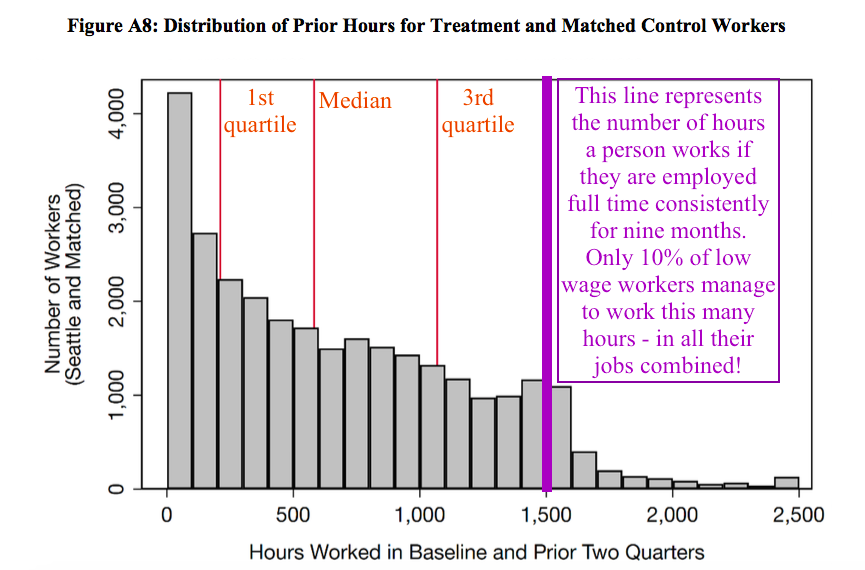The data have some important limitations:
Hello everyone arguing about the #minimumwage! Someday I'll post a thread about the evidence our @UW team compiled in Seattle.
Today let's talk about hours.
Raise the wage on most low-paying jobs & workers still don't have enough to live on. Because they can't get enough hours.

The data have some important limitations:
-No "informal" employment
-No jobs outside WA
However if a worker is holding 2+ job we can "see" all of them and include them all in calculating how many hours they work.
The median low wage worker works ~800 hours per year.
That's below the poverty line for a single person, and less than half the poverty line for a family of 4.
Whereas if you could get full time hours (2,000/year) your income would be $30k.
Since the minimum wage is specified in dollars/hour, it can't guarantee a living income.
Imagine this: every job must offer either
a) $15/hour
b) $400/week for up to 40 hrs ($15/hr overtime)
In exchange for a lower hourly rate, businesses would have to accept risk that, under current policy, they shift to workers.
Consider the case of a beer garden in Seattle.
(at least in the days before Seattle regulated this!)
More from Society
Krugman is, of course, right about this. BUT, note that universities can do a lot to revitalize declining and rural regions.
See this thing that @lymanstoneky wrote:
And see this thing that I wrote:
And see this book that @JamesFallows wrote:
And see this other thing that I wrote:
One thing I've been noticing about responses to today's column is that many people still don't get how strong the forces behind regional divergence are, and how hard to reverse 1/ https://t.co/Ft2aH1NcQt
— Paul Krugman (@paulkrugman) November 20, 2018
See this thing that @lymanstoneky wrote:
And see this thing that I wrote:
And see this book that @JamesFallows wrote:
And see this other thing that I wrote:
It is simply not correct to point fingers at wind & solar energy as we try to understand the situation in TX. The system (almost) had a plan for weather (almost) like this. 1/x
It relied on very little wind energy - that was the plan. It relied on a lot of natural gas - that was the plan. It relied on all of its nuclear energy - that was the plan. 2/x
There was enough natural gas, coal and nuclear capacity installed to survive this event - it was NOT "forced out" by the wind energy expansion. It was there. 3/x
Wind, natural gas, coal and nuclear plants all failed to deliver on their expectations for long periods of time. The biggest gap was in natural gas! The generators were there, but they were not able to deliver. 4/x
It may be fair to ask why there is so much wind energy in ERCOT if we do NOT expect it to deliver during weather events like this, but that is an entirely different question - and one with a lot of great answers!! 5/x
Conservatives are using the Texas power chaos to argue against climate policy even as fossil-generated power outages dwarf the amount of renewables knocked offline during the historic deep freeze. President Biden and progressives have been slow to respond.https://t.co/UajKhptEAU
— E&E News (@EENewsUpdates) February 17, 2021
It relied on very little wind energy - that was the plan. It relied on a lot of natural gas - that was the plan. It relied on all of its nuclear energy - that was the plan. 2/x
There was enough natural gas, coal and nuclear capacity installed to survive this event - it was NOT "forced out" by the wind energy expansion. It was there. 3/x
Wind, natural gas, coal and nuclear plants all failed to deliver on their expectations for long periods of time. The biggest gap was in natural gas! The generators were there, but they were not able to deliver. 4/x
It may be fair to ask why there is so much wind energy in ERCOT if we do NOT expect it to deliver during weather events like this, but that is an entirely different question - and one with a lot of great answers!! 5/x



















